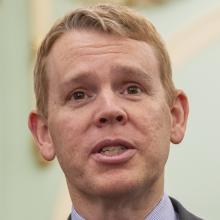Former Otago Polytechnic chief executive Phil Ker has called for an apology from Education Minister Chris Hipkins for turning the country’s polytechnic education system into "a national disgrace".
It comes in the wake of last week’s apology from Te Pukenga’s acting chief executive over its beleaguered financial situation and delays in transitioning the country’s polytechnics into a single entity.
However, Mr Hipkins said the system was no longer sustainable, and change was necessary.
Mr Ker agreed change was needed, but said the problems the system faced were not being addressed.
"The so-called reforms are basically a solution for the wrong problem.
"Actually, I think they were simply an ego trip on the Minister of Education’s part, to be frank."

The core issue was the inadequacy of funding for the polytechnic sector, and between now and the final transition, there would need to be severe staff cuts across the entire network of providers and subsidiaries, he said.
"I’d be staggered if there are not redundancies.
"You can’t address the problems of the magnitude that we have in the sector at the moment without redundancies."
He believed hundreds of millions of dollars had been spent to reform a system that was not actually broken.
"Those hundreds of millions have just gone into structural stuff.
"Not a single dollar has been put into improving outcomes for learners, not a single dollar to strengthening the regional providers, and so the issues that we had before Mr Hipkins started this misguided venture are not only still there, they’re worse."
There was a range of solutions — one being an overhaul of management at Te Pukenga, Mr Ker said.
"They’re just not up to the task."
Another was to reconstruct a model where there was a central agency — which would still be Te Pukenga — that confined its energies to those matters that needed central guidance.
"For example, New Zealand learners are desperately in need of a vastly improved learner support system.
"The bulk of our learning does not occur on campuses. What that means is that support for learners — academic support, pastoral care, health support — these things can’t be delivered to learners nationwide.
"They’re not being delivered now, not by a long shot. This is something that can’t be put together by individual providers, and so it could be a Te Pukenga initiative to do so.

The initial goal was to build a system that delivered more education to more people — particularly Maori, Pasifika and people with disabilities — and to do it better.
"I would challenge you to find a single, solitary additional initiative in the last two years that has delivered more or better. It just hasn’t happened.
"I think it’s a national disgrace."
Colleagues still working in the system felt Te Pukenga was trying to drive a compliance model, obsessed with rules, standardisation,and people obeying the rules, Mr Ker said.
He said the situation had left staff "very disillusioned and disaffected" and thought it was appropriate that Te Pukenga leaders apologise to staff because they deliberately pushed away people already in the system that had the knowledge, experience and skill to help drive it.
"I want the minister to apologise for this mess that he has foisted on the economy.
"What we were looking for was something that recognised the need for some centralisation, but what we got was a minister that went to the extreme model.
"They don’t need to keep going towards that extreme model. There is a halfway house that will give us the best of both worlds — the best of very agile, innovative, autonomous institutions and the best of a central agency that deals with the things that the individual providers just can’t do because they’re too small and disconnected."
Mr Hipkins said he found it difficult to understand Mr Ker’s claim the Government had done nothing to deliver more for students over the past two years.
"Fees free, and the Targeted Training and Apprenticeship Fund from Budget 2020, have supported more than 208,100 and 209,200 learners respectively since they were each introduced, up to April 2022.
"An aligned initiative, Apprenticeship Boost, has supported employers to keep on over 47,000 apprentices through Covid-19, contributing to one of the lowest unemployment rates this country has seen."
The old polytechnic system had strengths and weaknesses, but the sector needed to recognise it was not delivering the skilled workers that employers and businesses were crying out for, he said.
There was an increasing trend towards more on-the-job learning through apprenticeships, and by bringing the old industry training and polytechnic sectors together under one umbrella, the strengths of both could be harnessed, Mr Hipkins said.
The previous competitive model of polytechnic provision was damaging, he said.
Having Otago Polytechnic set up a campus in Auckland and compete with two other local polytechnics to gather $20 million a year in revenue was not sustainable.
He agreed the sector was "seriously underfunded" and needed significant change, while continuing the ability of local communities to innovate, and improving the connections with local businesses to tackle regional skills shortages, Mr Hipkins said.
"That’s what the transition is well on its way to enabling.
"I want innovation to focus on education and training, rather than having to set up non-core revenue schemes."












